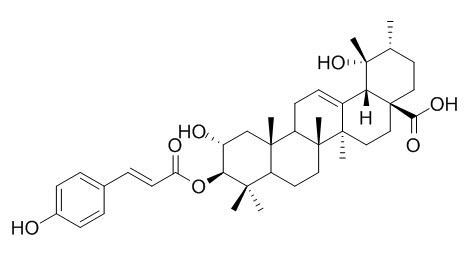3-O-trans-p-Coumaroyltormentic acid

3-O-(E)-p-coumaroyl tormentic acid may be promising lead compound for developing an effective drug for treatment of leukemia, it induces apoptotic cell death in human leukemia (HL60) via mainly mitochondrial pathway by, at least in part, Topo I inhibition. 3-O-trans-p-coumaroyltormentic acid shows cytotoxicity against four human tumor cell lines (A549, SK-OV-3, SK-MEL-2, and HCT-15) in vitro, the IC50 values of 13.72, 14.29,14.61, 14.04 uM, respectively. 3beta-O-cis-p-Coumaroyltormentic acid, and 3beta-O-trans-p-coumaroyltormentic acid are weakly selective for vancomycin-resistant Enterococcus (VRE) compared with eukaryotic cells, with an MIC of 59.4microg/mL and a 50% inhibitory concentration (IC50) of 72.0microg/mL for monkey kidney epithelial (MA104) cells. A mixture of 3-O-cis-p-coumaroyltormentic acid and 3-O-trans-p-coumaroyltormentic acid shows an inhibitory effect comparable to (-)-epigallocatechin gallate (EGCG) of green tea on the activation of Epstein-Barr virus early antigen (EBV-EA) induced by 12-O-tetradeca--noylphorbol-13-acetate (TPA).
Inquire / Order:
manager@chemfaces.com
Technical Inquiries:
service@chemfaces.com
Tel:
+86-27-84237783
Fax:
+86-27-84254680
Address:
1 Building, No. 83, CheCheng Rd., Wuhan Economic and Technological Development Zone, Wuhan, Hubei 430056, PRC
Providing storage is as stated on the product vial and the vial is kept tightly sealed, the product can be stored for up to
24 months(2-8C).
Wherever possible, you should prepare and use solutions on the same day. However, if you need to make up stock solutions in advance, we recommend that you store the solution as aliquots in tightly sealed vials at -20C. Generally, these will be useable for up to two weeks. Before use, and prior to opening the vial we recommend that you allow your product to equilibrate to room temperature for at least 1 hour.
Need more advice on solubility, usage and handling? Please email to: service@chemfaces.com
The packaging of the product may have turned upside down during transportation, resulting in the natural compounds adhering to the neck or cap of the vial. take the vial out of its packaging and gently shake to let the compounds fall to the bottom of the vial. for liquid products, centrifuge at 200-500 RPM to gather the liquid at the bottom of the vial. try to avoid loss or contamination during handling.
Molecules2022, 27(12):3824.
Food Res Int.2017, 96:40-45
CZECH MYCOLOGY2021, 73(1):1-19.
Journal of Pharmaceutical Investigation2024, 024-00662-1.
Biology (Basel).2020, 9(11):363.
Antioxidants (Basel).2023, 12(12):2078.
J Nat Prod.2018, 81(4):966-975
Pharmacological Reports2020, 1-9
Research Square2021, 10.21203.
J Pharmaceutical Research Int.2021, 33(41A):275-284.
Related and Featured Products
Phytochemistry. 2002 Feb;59(3):315-23.
Production of bioactive triterpenes by Eriobotrya japonica calli.[Pubmed:
11830140 ]
METHODS AND RESULTS:
Callus tissue cultures induced from an axenic leaf of Eriobotrya japonica (Rosaceae) produced triterpenes in large amounts (ca. 50 mg/g dry wt). Nine triterpenes were characterized as ursolic acid, oleanolic acid, 2alpha-hydoxyursolic acid, maslinic acid, tormentic acid, 2alpha, 19alpha-dihydroxy-3-oxo-urs-12-en-28-oic acid, hyptadienic acid and a mixture of 3-O-cis-p-coumaroyltormentic acid and 3-O-trans-p-Coumaroyltormentic acid. The triterpene composition in the callus tissues was noticeably different from that in intact leaves. The contents of tormentic acid with antidiabetic action, and 2alpha, 19alpha-dihydroxy-3-oxo-urs-12-en-28-oic acid with anti-HIV activity, were much larger than those in the intact leaves.
CONCLUSIONS:
All of the triterpenes isolated from the callus tissues showed an inhibitory effect comparable to (-)-epigallocatechin gallate (EGCG) of green tea on the activation of Epstein-Barr virus early antigen (EBV-EA) induced by 12-O-tetradecanoylphorbol-13-acetate (TPA). 2alpha, 19alpha-Dihydroxy-3-oxo-urs-12-en-28-oic acid was the most potent inhibitor among them and caused a significant delay of two-stage carcinogenesis on mouse skin.
Chem Pharm Bull (Tokyo). 2011;59(3):378-81.
3-O-(E)-p-coumaroyl tormentic acid from Eriobotrya japonica leaves induces caspase-dependent apoptotic cell death in human leukemia cell line.[Pubmed:
21372421]
Eleven triterpene acids, 1-11, isolated from the leaves of Eriobotrya japonica, were evaluated for inhibition of DNA topoisomerase (Topo) I and cytotoxicity against human leukemia (HL60) and melanoma cell lines (CRL1579).
METHODS AND RESULTS:
Among the compounds tested, four compounds, δ-oleanolic acid (4), ursolic acid (5), 3-O-(E)-p-coumaroyl tormentic acid (3-O-trans-p-Coumaroyltormentic acid,8), and betulinic acid (10), exhibited potent Topo I inhibitory activity (IC(50) 20.3-36.5 μM) and cytotoxicity against HL60 (EC(50) 5.0-8.1 μM). Upon assessing the apoptosis-inducing activity in HL60 cells, compound 8 exhibited induction of apoptosis detected by the observation of DNA fragmentation and membrane phospholipid exposure in flow cytometry. Western blot analysis showed that compound 8 markedly reduced the levels of procaspases-3 and 9, while being increased the levels of cleaved caspases-3 and 9. On the other hand, compound 8 exerted almost no influence on the expression of caspase-8. In addition, compound 8 increased significantly Bax/Bcl-2 ratio and activated caspase-2.
CONCLUSIONS:
These results suggested that compound 8 induced apoptotic cell death in HL60 via mainly mitochondrial pathway by, at least in part, Topo I inhibition. Therefore, compound 8 may be promising lead compound for developing an effective drug for treatment of leukemia.
Chem Pharm Bull (Tokyo). 1989 Mar;37(3):648-51.
Cytotoxic triterpenes from a Chinese medicine, Goreishi.[Pubmed:
2752475]
METHODS AND RESULTS:
Bioactivity-guided fractionation of the methanol extract of Goreishi (the feces of Trogopterus xanthipes Milne-Edwards) afforded one new and three known cytotoxic triterpenes, namely, 3-O-cis-p-coumaroyltormentic acid, pomolic acid, 2 alpha-hydroxyursolic acid, and jacoumaric acid. In the course of this investigation, six additional compounds having no cytotoxic activity were isolated, namely, maslinic acid, 3-O-trans-p-coumaroylmaslinic acid, ursolic acid, tormentic acid, euscaphic acid, and a new triterpene, 3-O-trans-p-Coumaroyltormentic acid.
CONCLUSIONS:
The structures of the new compounds were established on the basis of X-nucleus-proton correlation with fixed evolution time (XCORFE) and other spectroscopic evidence.



